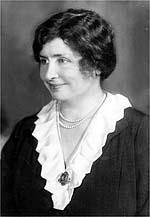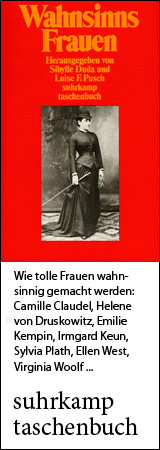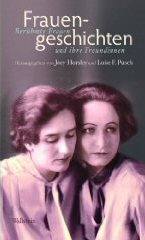
(Helen Adams Keller)
born on June 27, 1880 in Tuscumbia, Alabama, United States
died on June 1, 1968 in Westport, Connecticut, United States
American deafblind writer and activist
145th birthday on June 27, 2025
Biography
Helen Keller was born a healthy child. At eighteen months – she already spoke a few words – she contracted a life-threatening inflammation of the brain that left her completely blind and deaf.
Five years of mental dullness and lethargy followed, interrupted only by desperate outbursts of rage. The rescue came when Helen was seven years old in the form of Ann Sullivan (1866-1936), a teacher who was blind. She taught Helen to communicate first by spelling words with finger taps on Helen’s palm, later by teaching her braille and fingerspelling. At the age of ten and after incredible effort, Helen also learned to speak – as the only deaf-blind person in the United States. At 16, she enrolled at the girls' grammar school in Cambridge, Massachusetts, and at 19 she passed the entrance examination at Radcliffe College. She majored in French, German, Latin, literature, philosophy, economics and politics because she “had a craving for books and knowledge and devoured entire libraries in braille.”
Helen Keller began writing at an early age. She published her first book at the age of 24 in 1904: The Story of My Life, an autobiography, made her world-famous overnight.
She lived to be 87, taking many journeys over the course of her long life. She appeared at 249 events in 123 cities, addressing a total of 250,000 people in support of the cause of the deaf and blind. She enjoyed a close friendship with Mark Twain, and the industrialist Andrew Carnegie awarded her with a life annuity.
Helen Keller was a convinced socialist and pacifist. Her book Out of the Dark contains many reflections on the role of women. She rejected false assumptions about women and reacted with outrage to the injustice women suffered (“An Appeal to Reason”). She loved Shakespeare's language, but disapproved of his views on women, which she said were “neither original nor enlightened.”
In a letter “To an English-Woman Suffragist,” she wrote in 1911: “I am indignant at the treatment of the brave, patient women of England. I am indignant when the women cloakmakers of Chicago are abused by the police. I am filled with anguish when I think of the degradation, the enslavement and the industrial tyranny which crush millions, and drag down women and helpless children.”
(Text from 1987; translated with DeepL.com; edited by Ramona Fararo, 2025.
Please consult the German version for additional information, pictures, sources, videos, and bibliography.)
Author: Ursula Reis
If you hold the rights to one or more of the images on this page and object to its/their appearance here, please contact Fembio.



